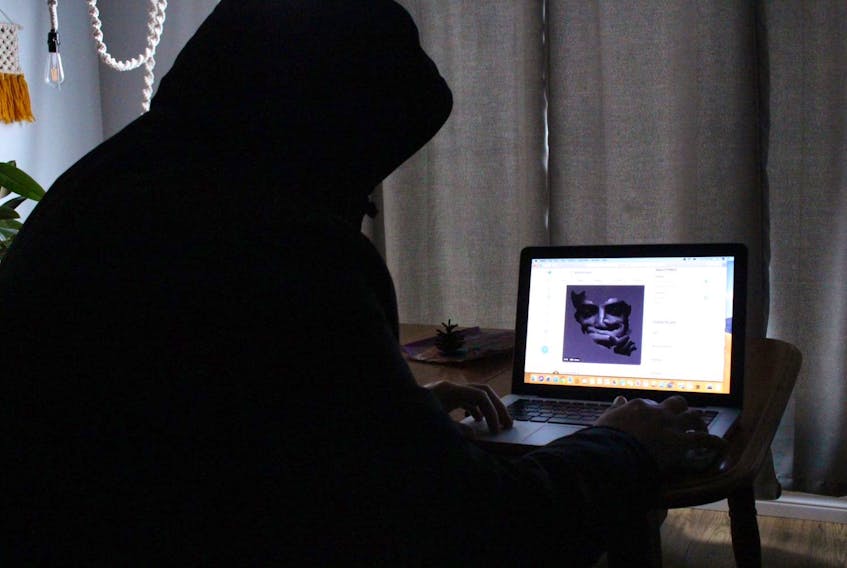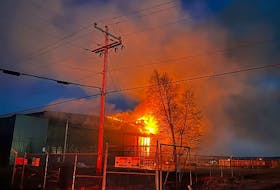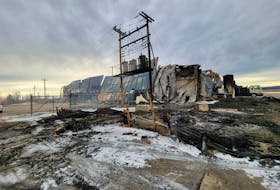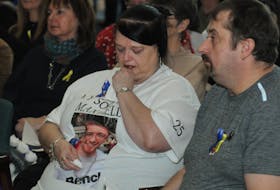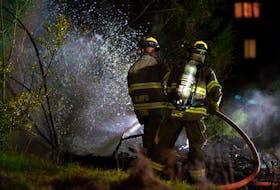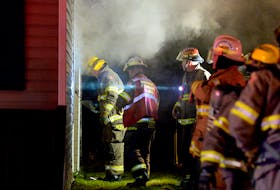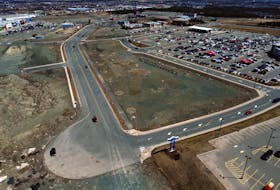ST. JOHN'S, N.L. — Editor's note: The Telegram has chosen to use pseudonyms in this story in order to protect the identities of the individuals quoted.
There was light snow falling from an otherwise clear sky in St. John's when Bozorgmehr received the news his fellow countrymen and women in Iran had taken to the streets.
“Without any notice government decided to triple the gas price,” he said. “Gas price has been subsidized in Iran, as always.
“(But) they have a deficit for their next annual budget. The easiest way to compensate is through people’s money.”
He says the protests were peaceful until Iranian officials sent plainclothes militia — known as the Basij — into the streets.
“In a demonstration you cannot tell which one is which, who is who,” he says. “They can be among people and start shooting. … There (will be) video captured that (make it appear) that this is the people.”
The Basij is an arm of the Revolutionary Guard made up volunteers, though Bozorgmehr suspects they are compensated.
By undermining the protesters' claim to being peaceful, the government can justify the use of force, he said.
Confirmed: Internet access is being restored in #Iran after a weeklong internet shutdown amid widespread protests; real-time network data show national connectivity now up to 64% of normal levels as of shutdown hour 163 📈📵#IranProtests #Internet4Iran
— NetBlocks.org (@netblocks) November 23, 2019
📰https://t.co/XQmiaOlRL7 pic.twitter.com/eimWEIEmrI
According to Amnesty International, 143 people have been killed by government forces since the protests started in Iran, though they believe the number is significantly higher.
The government imposed a near total shutdown of communication between Iranians and the outside world for almost a week, according to NetBlocks, a website that tracks internet connectivity across the globe.
“The only way that I can contact my loved ones (in Iran) is internet,” Bozorgmehr says. “It’s a very horrifying silence.”
He describes Iran as a totalitarian dictatorship that doesn’t believe in human rights and uses force as the first course of action.
But the experience of Iranian people cannot be defined singularly, Bozorgmehr says, as there are people who are in favour of the regime and people who are against.
For Bozorgmehr, reading fiction helped him understand the reality of life under the regime. In particular, George Orwell’s, "Nineteen Eighty-Four."
“When I was reading that, I thought, oh my god, I’m living in that. I’m living in 1984,” he said.

In favour of the regime or not, people are further divided by class, which makes it hard for the people’s interests to align at any given time. Right now, he says, it’s mostly working-class people who are taking to the streets, as they have been hit the hardest.
While the Iranian government wants people to believe foreign sanctions alone are responsible for the current economic situation, it’s not that simple, Bozorgmehr says.
“People believe corruption and embezzlement … is the main cause of economic inequality, economic injustice,” he says.
As well, he believes the Iranian regime has placed the spread of Islam ahead of the interests of Iranians.
“We do not want to spend our money just to fight with Israel, or with Saudi Arabia, or with the (United) States,” he says.
He said that money should be spent on the Iranian people.
“People are suspended between these two ambiguous and dark worlds. … You’re not dead, but you’re not alive, either.” —Bozorgmehr
The regime also claims the demonstrations are led by those same enemies, according to Bozorgmehr.
“That is totally invalid,” he says.
Bozorgmehr fears if the situation in Iran continues in this direction it may turn into another Syria, and he worries about militant Islamic groups like ISIS.
“In one (way) you do not want this government to be there because they are a source of chaos,” he says. “And in other (ways), you do not want to even lose this little bit of security.
“People are suspended between these two ambiguous and dark worlds. … You’re not dead, but you’re not alive, either.”
Bozorgmehr is neither optimistic nor pessimistic about the future of his home country.

Harsh regime
For Arousha, another Iranian living in Newfoundland, there is no hope at all while the regime is still in power.
Over a hot coffee and a scone, she recalls waking up to the news just days before. She texted her father immediately, asking if he had access to the internet.
He responded with a series of emojis, laughing and wondering why she would ask.
But an hour later there was an internet black out. She then spent three days watching the news. Thankfully, she says, she could contact her family through a landline.
“My mom, the other day … she was like, ‘Oh, by the way, I’ve been meaning to tell you this, but don’t ever think about coming back,’” Arousha said.
Her mother fears Arousha would be arrested on arrival, given her background in activism.
“But now you go out and you just get killed and they don’t even give your corpse to your family.” —Arousha
While there are legal rights on the books for the citizens of Iran, Arousha says they don’t actually exist. Security forces can arrest anyone for any reason and not fear being held accountable, she says.
“I don’t even consider myself an activist,” she says. “Now I’m afraid. Am I a threat? Am I going to be put in prison? I don’t know.”

In the 2009 protests a similar number of protesters were killed, though it was over a span of a month at that time, rather than the few days in the current unrest.
“They’re getting harsher every day,” she says. “The price is too high.”
She says in 2009, arrest was the biggest concern.
“But now you go out and you just get killed and they don’t even give your corpse to your family because that’s just how they terrorize people.”
While the government is elected every four years, Arousha says, the ayatollah and Islamic clerics rule the country and can veto any decision made by elected officials.
“The president is basically a puppet,” she says. “He doesn’t have any power.”
According to NetBlocks, access to the internet has been restored in some of the provinces in Iran, though only in people’s homes — not to their cellphones.
But, Arousha says, many of the provinces near the borders are still without much access, something she attributes to the government's concern with the concentration of minorities in those areas, and the proximity to other countries.
Twitter: @AndrewLWaterman
Note: This story has been updated.
RELATED

